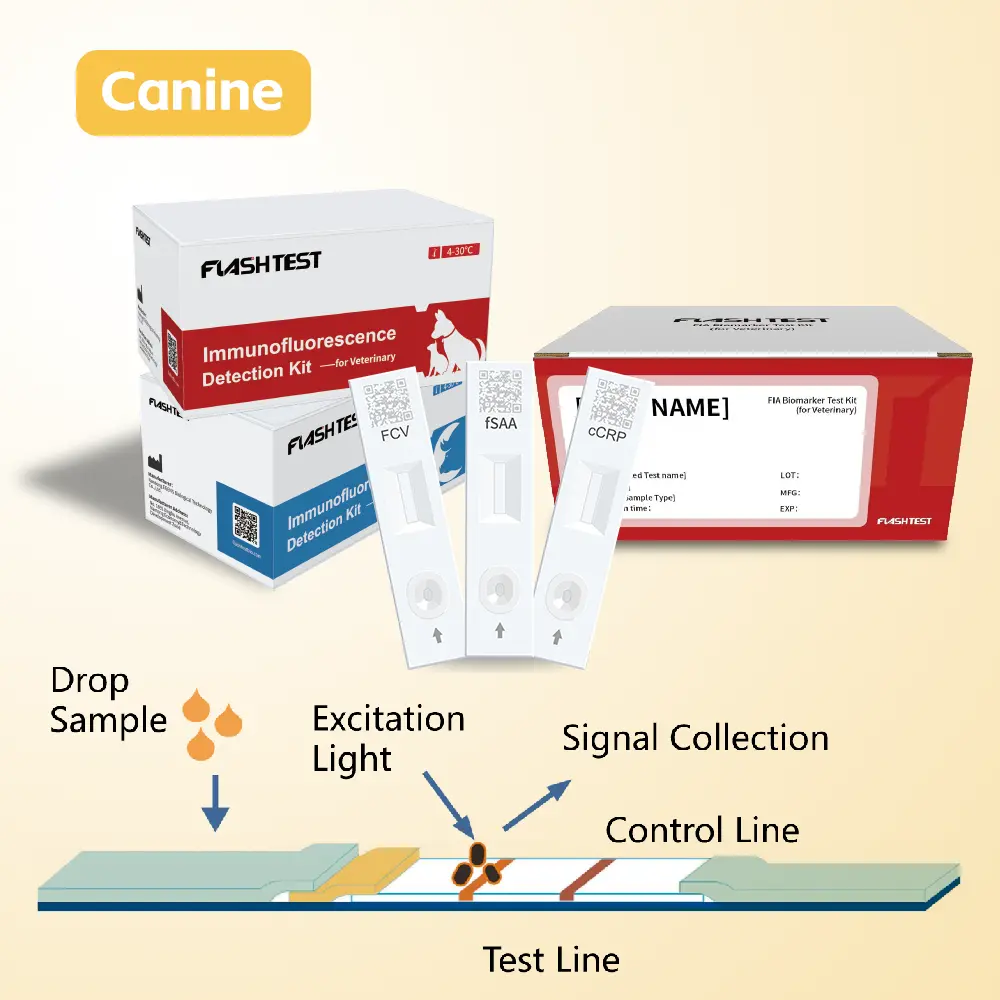- +1-707-722-7066
- care@flashtestbio.com
English
This is an FIA immunofluorescence assay reagent card used to detect Canine pancreatic-specific lipase (cPL). Immunofluorescence technology has the characteristics of high specificity, high sensitivity, and intuitive results. Utilizing this technology and the FLASHTEST FIA detection platform, we can detect whether your beloved pet carries Canine pancreatic-specific lipase (cPL) through this small card.


Canine pancreatic-specific lipase (cPL) is an enzyme secreted by the acinar cells of the canine pancreas. Under normal circumstances, its content in the blood is extremely low. However, when the pancreas undergoes pathological changes, especially in pancreatitis, pancreatic cells are damaged, and cPL is released into the blood in large quantities, resulting in a significant increase in the concentration of cPL in the blood.
Clinical application:
Diagnosis of Pancreatitis:
Acute pancreatitis: The increase in cPL level is one of the important indicators for diagnosing acute pancreatitis. When a dog shows symptoms such as vomiting, abdominal pain, and listlessness, combined with a significantly increased cPL test result, acute pancreatitis can be highly suspected.
Chronic pancreatitis: For the diagnosis of chronic pancreatitis, cPL detection also has a certain auxiliary role.
For example, if a dog suddenly vomits frequently, has tense abdomen, and the blood cPL test result is far beyond the normal range, combined with clinical symptoms and other examinations, it can be diagnosed as acute pancreatitis.
Differential Diagnosis:
Distinguish from other digestive system diseases: When a dog shows digestive system symptoms, cPL detection helps to differentiate and diagnose pancreatitis from other gastrointestinal diseases such as gastritis and enteritis.
For example, if a dog has both vomiting and diarrhea, and the detected cPL level is normal, pancreatitis can be preliminarily excluded, and the diagnostic focus can be shifted to other gastrointestinal diseases.

The FLASHTEST FIA pet analyzer has 35 available tests covering inflammation, pathogens, antibodies, endocrines, and more. Test strips are not visually readable and require the FLASHTEST FIA Analyzer. This product is the Canine pancreatic-specific lipase (cPL test card featuring:
On-card QR code provides test info and a calibration curve.
Quantitative detection.
2-minute room temperature incubation.
Results in 3 minutes.
Room temperature shipping and storage.
2-year shelf life.
| Brand | FLASH TEST |
| Product Name | Canine pancreatic-specific lipase (cPL) |
| Product Code | 2018 |
| Specifications | 10 Test/ Box |
| Applicable Animals | Dogs |
| Sample Type | Serum/plasma |
| Reagent Shelf Life | 1. Store the test kit at 4~30℃ up to the expiration date. 2. The test should operate at (18~28) ℃ after the Test Device opening. 3. Once the pouch is opened, the test should be performed within 30 minutes. |
| Transportation Requirements | Room temperature |
| Storage Requirements | Room temperature |
| Packaging Dimensions | 155 x 100 x 80 mm³ |
| Weight | 163g |
For any inquiries or queries regarding our animal lab test kits and in vitro diagnostic devices, please don't hesitate to reach out to us directly or fill out our online form. We are here to assist you and provide prompt responses to your questions.

Tel:
+1-707-722-7066Email:
care@flashtestbio.comAdd:
Blk A4 - F2, Liyuan Development Zone, Binhu District, Wuxi, China
![[2040]Canine Troponin I (Canine cTnI) [2040]Canine Troponin I (Canine cTnI)](/uploads/image/20250112/12/Canine-Troponin-I-Canine-cTnI-Test-Kit.webp)
![[2034]Canine cortisol (cCOR) [2034]Canine cortisol (cCOR)](/uploads/image/20250112/12/Canine-cortisol--cCOR-Test-Kit.webp)
![[2030]Canine progesterone (cProg) [2030]Canine progesterone (cProg)](/uploads/image/20250112/12/Canine-progesterone-cProg-Test-Kit.webp)